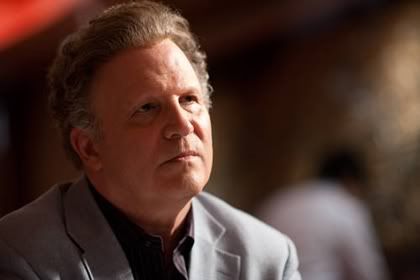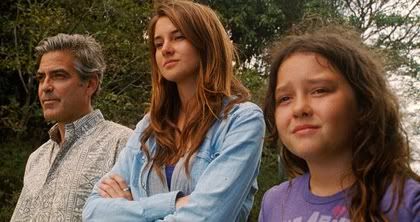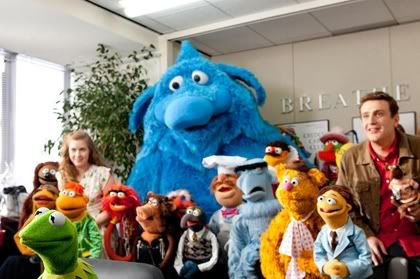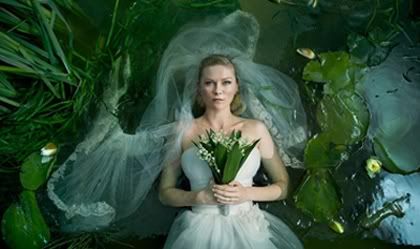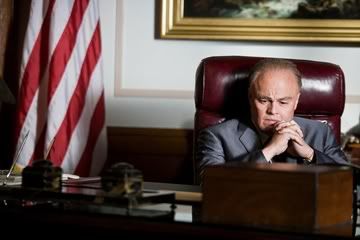It has been seven years since we've received a film
from writer and director Alexander Payne. The last was 2004's Best Picture
nominee Sideways. His new film, "The Descendants," is exactly what
we've come to expect from Payne as a filmmaker and a guaranteed Best
Picture contender at this year's Oscars. It is a miracle how
effortlessly Payne captures the messiness of life. He is a master at digging
deep and bringing out rich meaning and emotion out of situations that also make
you laugh. In all of his films he performs a carefully choreographed balancing
act between wit and poignancy, sharp comedy and shattering drama -- this one is
no different and could even be considered Payne's best yet.
Adapted from the 2009
novel by Kaui Hart Hemming and co-written by Payne, the movie takes place in
Hawaii not just for the hell of it. The setting of Hawaii plays a major role,
and an opening voiceover from Matt King (George Clooney) describes the
misconceptions of living in such a tropical and exotic locale. It's not a
24-hour vacation, and people living there aren't immune to life's challenges.
It's no paradise, and the Hawaii we see is the real thing thanks to
cinematographer Phedon Papamichael. "Fuck paradise," Matt says. Just
as Payne used the specifics and peculiarities of Nebraska in "About
Schdmidt" or California wine country in "Sideways," he allows
Hawaii to play into the film's themes on family ties.
Matt has a wife and
two daughters. His thrill-seeking wife, Elizabeth (Patricia Hastie), suffered a
boating accident and lies in an irreversible coma. This forces Matt, the self-proclaimed
back-up parent or understudy, to step up and care for the girls. The younger
one, 10-year-old Scottie (Amara Miller), is angry and confused. Alex (Shailene
Woodley of TV's "The Secret Life of the American Teenager"), her
17-year-old sister, had trouble with drugs in her past and just seems plain
angry. Matt doesn't know what to do with either of them, but he starts by
bringing Alex back home from her boarding school which resides on
another island. As Matt says, his own family resembles the archipelago of
Hawaii. Like the islands, they are in loose proximity but remain separate and
alone ever so gradually drifting away from one another.
It's ironic because
Matt's family tree stretches all the way back the earliest white settlers in
Hawaii. As a descendant of this land-owning family and the sole trustee, he
must personally decide whether or not to open up a vast tract of gorgeous
forest land on Kauai to tourist or condo development. The rest of his bloodline
has devolved into a group of men in floral shirts and sandals, his cousins who
support or hate him in whatever decision he makes in how to develop the land --
or to sell it at all. And though this subplot is the biggest news to the
locals, for Matt it's a mere distraction from tending to his family.
Matt's personal
predicament plays out as equal parts unpredictable, moving and humorous. This
is especially true once his oldest daughter Alex lays a bomb of a revelation on
him. She caught her mom cheating. So, not only does Matt have to face his
wife's impending death, but now her past infidelity. Sometimes there is no
reasoning to the way we react to a circumstance, especially in the midst of a
crisis or tragedy. How we deal with guilt, regret, anger, jealousy, remorse,
sadness -- it's all unstable. So Matt's impulsive trip to stalk his wife's
lover feels just right. There are moments of absurdity that still feel genuine
in the context. For example, Matt lets Alex keep her idiot pseudo-boyfriend
(Nick Krause) around for the ride; the youngest, Scottie, spurts obscenities
regularly; and upon discovering the news about his wife, Matt slips on loafers
and does an awkward brisk shuffle over the neighbor's house to find out more.
As we follow Matt's
emotional, legal and family issues, we eventually find out they're all linked.
Payne handles this with great finesse, and it doesn't feel at all forced. He
could've allowed for an onslaught of melodrama because the plot and subplots do
have that potential, but instead he takes the smarter route -- the route he
always takes in his filmmaking and that is of low-key observation. Every moment
in the movie feels utterly true to life. That includes Matt's confrontation
with his wife's lover, Brian Speer (Matthew Lillard). Just when you think you
have the scene trajectory figured out, Payne manages to surprise with
unexpected eloquence.
It appears George
Clooney just keeps getting better. Here is another career-topping performance. He
is out of his comfort zone from his usual self-composed cool demeanor such as
in "Up in the Air." As Matt King, he is flustered, overwhelmed and
uncertain. Clooney has never been better, and he roots himself into this
character and gives an unabashedly raw performance. Payne is gifted in drawing
a keen essence out of each actor's performance including Robert Forster as
Elizabeth's permanently enraged father and Judy Greer as Brian Speer's wife who
has a scene of bottled up force. The most notable performance stands right up
there with Clooney in terms of award consideration, and that's from young
actress Shailene Woodley. She is biting, smart and tough giving off the
air of teenage angst while also sincerely caring for her father.
"The
Descendants" closes rather poetically with a scene of solace, and it
could've ended there. But Payne decides to add one more, a quiet coda that sums
up the mood. The closing shot brilliantly encapsulates the condition of many
families today. Here's a film that not only acknowledges but celebrates the flaws
in humanity because we've all got them. Might as well embrace it.
